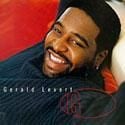
Vocalist Gerald Levert has been one of the most dependable R&B performers over the past decade. While Levert rarely takes artistic risks, his vocals, still reminiscent of his legendary father co-O’Jay lead Eddie Levert (you know we got to give Walter some luv to), and writing skills have matured considerably since his days as lead of the trio Levert, which also featured his brother Sean Levert and Marc Gordon. After two successful solo releases, Private Line (1991) and Groove On (1995), Gerald Levert lent his talents to the super-group LSG, made up of original New Jack-playa Keith Sweat (bruh know how to get his whine on), the enigmatic Johnny Gill (one of the best voices of his generation) and Levert. While the recording pushed Gill’s already puzzling career into the outer reaches of obscurity and Sweat, to the old-school circuit (Still in the Game, but not selling any records), the fairly successful recording allowed Levert to revisit his sound. The initial product of Levert’s retooling was 1998’s Love and Consequences. Largely produced and written with Edwin “Tony” Nicholas and Darell “Delite” Allamby who were both prominent on the L.S.G. project, Love and Consequences featured standouts like the lead single “Thinkin’ ‘Bout It,” the damn-near misogynistic divorce rant “Taking Everything” and the saucy remake of Bobby Womack’s (the last Soul Man) “That’s the Way I Feel About You” with Mary J. Blige. Levert’s latest release G, charts much of the same territory of Love and Consequences, but with a consistency and clarity that was absent on the previous recording.
Tracks like “Application (I’m Looking 4 a New Love)” and the “ghetto-rag to ghetto-fab” love song “Nothin’ to Somethin'” invoke the sound that LSG cultivated on their hit track “My Body.” Given the youthfulness that sells most contemporary R&B, as if J-Shinn, Usher and Donell Jones (really all the same person, artistically speaking) shed insight of complex and mature heterosexual relationships, Levert, who turns 34 in July (and one of those pretty-ass big men that I ain’t got the cash to truly emulate) has tried to gear his sound to the youth audience on the aforementioned tracks and others like “Callin’ Me” and “Heart Don’t.” But like his daddy, Gerald Levert’s strength lies in his reading of ballads. The current single, the popish “Mr. Too Damn Good,” finds Levert in his natural element, though songs like “Strings, Strings” and the Kelly Price duet “It Hurts Too Much to Stay” are better representative of the “heavy” R&B featured throughout the recording. While Levert subverted some of his vocal energy to fit the nuances of Mary J. Blige’s voice on “That’s the Way I Feel About You,” the duet with Price allows both them to fully explore the notion of the “old-school soul blow.”
The recording’s strongest moments are on songs like “She Done Been,” “Second Time Around,” and “These,” which mine the music of deep-soul icons of the 1970s like Millie Jackson (“Hurts So Good” and “Back in Love by Monday”) and Latimore (“Let’ s Straighten it Out”). While the lyrics to “She Done Been” gives a contemporary reading of the same drama the Spinners examined in their classic “Sadie,” (A good mother suffers for the children while suffering patriarchy), the musical feel is much like the sound that emanated out of the Malaco Recording Company, home to folks like Dorothy Moore (“Funny How Times Slips Away” and “Misty Blue”) and the late Z.Z. Hill in the mid-1970s and the current home of real old-schoolers like Tyrone Davis, Latimore, and Johnnie Taylor, whose “comeback” hit “Good Love” in 1996 got little if any airplay in NYC. It’s a sound that R. Kelly also invoked on “When Woman’s Fed Up” and the Hailey Brothers, with a nod to Bobby Womack, on “Life.” Perhaps the best track on the recording is “Misery,” which personalizes the problems of “brotherhood” in a way that the O’Jays themselves explored more broadly on “Don’t Call Me Brother,” from their best recording Ship Ahoy (1973). The vocal “break-down” at the end of the song, is every bit as brilliant as Eddie Levert’s on “Don’t Call Me Brother.”
Gerald Levert is never gonna take the risks that say a D’Angelo or a Maxwell have and his music is never going to be mistaken for that of The O’Jay’s and Gamble and Huff. In many regards, Gerald Levert is simply a good Soul singer and with the paucity of those currently in the recording industry, there’s nothing wrong with that.
